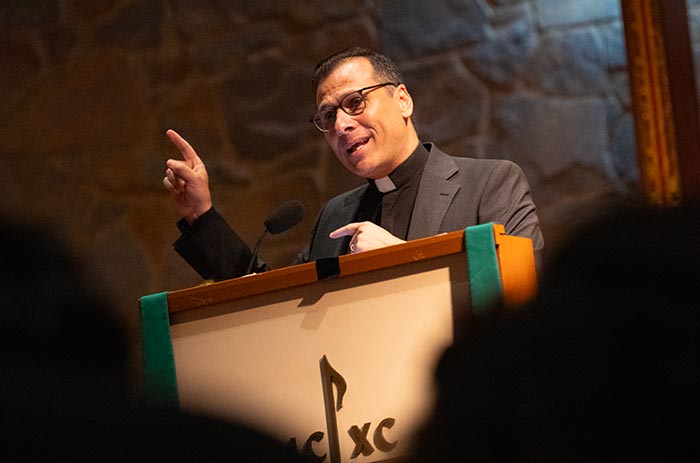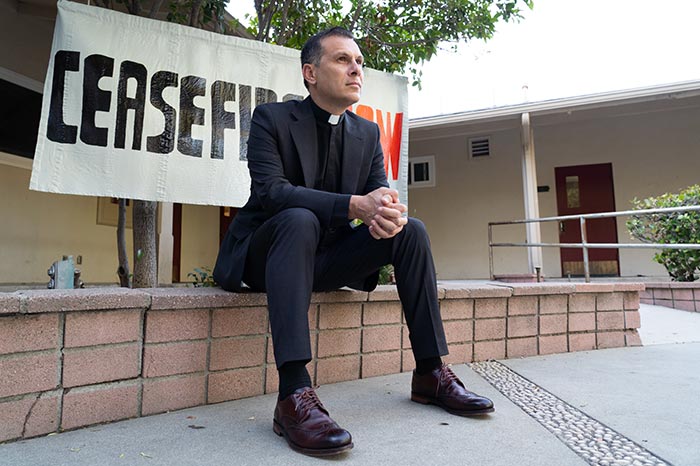A Christian voice for Palestine comes to Claremont

The Rev. Munther Isaac, a theologian and Palestinian Christian priest that heads the Israel-based Evangelical Lutheran Christmas Church and Evangelical Lutheran Church of Beit Sahour, delivered a guest sermon at Claremont Presbyterian Church on August 8. Courier photo/Andrew Alonzo
By Andrew Alonzo | aalonzo@claremont-courier.com
The Rev. Munther Isaac, a theologian and Palestinian Christian priest who heads the Israel-based Evangelical Lutheran Christmas Church and Evangelical Lutheran Church of Beit Sahour, delivered a nearly 40-minute guest sermon August 8 at Claremont Presbyterian Church.
The event was attended by about 400 people, and was organized by Friends of Sabeel North America, a Colorado-based nonprofit that bills itself as “a Christian voice for Palestine.”
Isaac’s talk was meant to explore “the impacts of the silence of U.S. churches in the face of the ongoing genocide and destruction of the Palestine homeland and Christian Zionism’s support of apartheid in the West Bank and Gaza,” according to a FOSNA news release.
The Courier spoke with Isaac prior to the talk, which is viewable at youtube.com, search “Claremont Presbyterian Church.”
“The main reason that I’m here is to talk about what’s happening in Gaza, and the fact that it’s been 10 months since the war broke and that we’re still talking about it,” Isaac said. “That we’re still pleading for a cease-fire, is disheartening.
“At the same time, I come with a mission: to call the U.S. churches to join us in our efforts. But not only that, to realize that their government and to a certain extent their theologies have contributed to this war in Gaza,” he said. “I am calling the church to action for change of course and for serious solidarity with Palestine.
“I think every person of faith must speak up because it’s a horrific tragedy that is happening in front of the … whole world’s eyes to see. If we’re not speaking as people of faith — as I kept saying throughout this tour and throughout the last 10 months — then by your silence, you’re complicit.
“We can’t claim to worship a God of mercy, compassion and justice, yet turn a blind eye to a genocide,” he said. “So, if you’re silent, then not only are you agreeing about the actions of Israel, you’re also agreeing about how the Bible was used to justify this genocide.
“I would argue as Christian leaders in particular we have to take a stand. Yes, it is for all people of faith, it’s for all humanity, but for Christians in particular, given how the Bible was weaponized, we must take a stand.”
Isaac said silence is complicity, and further explained its antithesis, “noise.”
“In the American context in particular, my hope is that the noise would result in change of policy by policymakers,” Isaac said. “At least noise says, ‘We were not silent. We tried. We took a stand.’ And history will remember those with that noise I believe, and that they were on the right side of history.”

The Rev. Munther Isaac, a theologian and Palestinian Christian priest that heads the Israel-based Evangelical Lutheran Christmas Church and Evangelical Lutheran Church of Beit Sahour, delivered a guest sermon at Claremont Presbyterian Church on August 8. Courier photo/Andrew Alonzo
Isaac said the upcoming school year on American college campuses will be pivotal, perhaps more so than the November 5 presidential election.
“One of the things I’ve been saying this tour is that what will happen in September is more important than what will happen in November when it comes to Palestine,” Isaac said. “It is my hope that university students … aided by faith leaders, will show Congressmen and women that the American people are not happy about this war.
“I see the protests as a sign of the change in the American public about the whole situation, not just Gaza,” he added. “I think several really important factors are happening in these protests, the first is we’re seeing an increased number of Jewish students speak vocally against Zionism and against the war in Gaza and take a lead even in these demonstrations; and second were seeing also maybe the coming out of age … of American Muslims who are clear in their American identity but are Muslims.
“Interestingly to see Muslims and Jews coming together in many of these protests and of course many Christian clergy as well is a hopeful sign, and I think could be a sign of things to come. Now, the big question remains, will that translate into change in policies? It takes time, I know it’s a marathon, but I know that there is something already happening, and I saw it.”
During his sermon, Isaac contended the war in Gaza has divided the world based on “ethical grounds.” “We need to know where you stand,” he said. “Are you on the side of justice or on the side of apartheid? It’s that simple.”
Isaac told the Courier he hoped his talk would instill a sense of “the frustration, the anger we have as Palestinians,” and an “urgency to act.”
“In Christianity we talk of Kairos moments,” Isaac said. “This is a Kairos moment, meaning this is a moment to act, to discern. And I will challenge people you’re either with justice or with apartheid, you have to decide.
“You can make a difference as an American sitting in a pew in a church, actually you can make a difference by the way you vote, by the pressure you can put on those you elect and by the accountability you demand from your government on the tax money you pay. I want them to realize that and be organized in such a way.”
Ventura residents Samantha and Josh Ketterling were on hand for Isaac’s talk. “It was encouraging because the things that he said to do I’m already doing,” Samantha Ketterling said, referencing Isaac’s challenge to push local and faith leaders to act. “The thing that kept sticking in my mind is the idea that Christian Zionism could be antisemitism,” Josh Ketterling added. “I think I’ll be mulling that one over for a while.”
Selina Harrigan, an activist with Chino Valley for Palestinian Liberation, said it was “very refreshing to hear a Christian leader speaking about issues of social justice unapologetically with so much moral courage.”
More information is at fosna.org.
1 Comment
Submit a Comment
You must be logged in to post a comment.







Correction: 400 or more people attended to hear Rev Isaac’s moving sermon. I was one of the organizers of this event. When RSVPs exceeded 300, we moved from the Good Shepherd Lutheran Church to Claremont Presbyterian that could seat at least 400. The church was full!
lora jo foo
Claremont